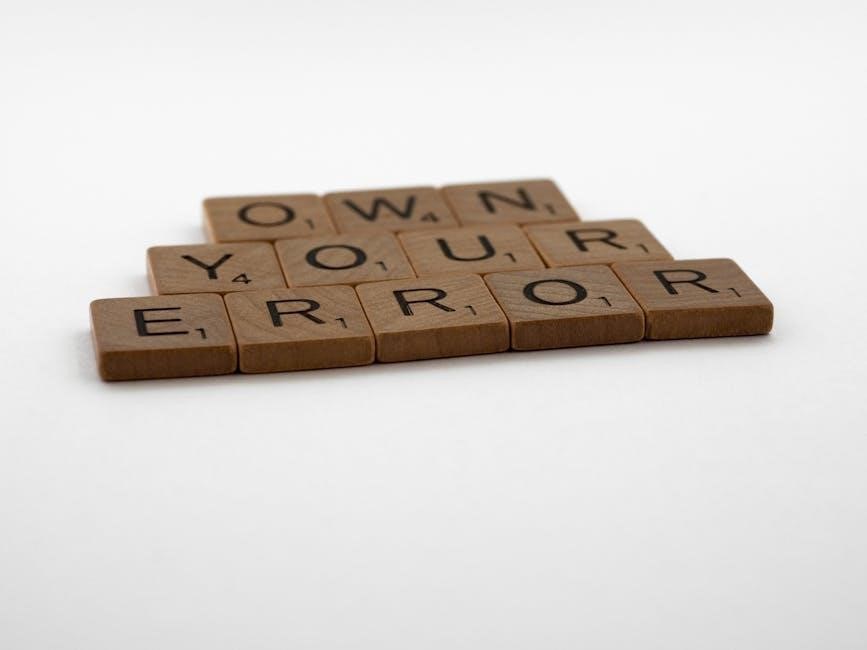“Let your conscience be your guide” is a timeless principle advising individuals to follow their inner moral compass․ It emphasizes trusting inner values to make ethical decisions‚ fostering personal integrity and self-awareness in daily life․
1․1 Definition and Origin of the Phrase
The phrase “Let your conscience be your guide” originates from the idea that each person possesses an internal moral compass․ Popularized by the song in Disney’s Pinocchio‚ it suggests trusting one’s inner voice for ethical decisions․ Rooted in philosophical teachings‚ it reflects the notion of conscience as a personal guide for distinguishing right from wrong‚ emphasizing integrity and self-awareness in decision-making processes․
1․2 Universal Relevance of Conscience in Decision-Making
Conscience serves as a universal guide‚ influencing decisions across cultures and belief systems․ It acts as an innate moral compass‚ helping individuals distinguish right from wrong․ By aligning actions with inner values‚ conscience fosters integrity and ethical behavior․ Its relevance lies in its ability to transcend external pressures‚ promoting self-awareness and accountability in personal and societal contexts‚ ensuring decisions reflect moral principles and promote harmony․
Understanding Conscience
Conscience is an innate moral awareness guiding individuals to distinguish right from wrong‚ influencing ethical decisions and promoting personal integrity and accountability․
2․1 What is Conscience?
Conscience is an innate moral awareness that distinguishes right from wrong‚ prompting ethical behavior and restraining harmful actions․ It serves as an inner guide‚ shaped by personal beliefs‚ values‚ and experiences‚ influencing emotional responses to decisions․ A clear conscience brings peace‚ while violating it leads to guilt and remorse‚ highlighting its role in maintaining integrity and accountability․ Conscience is universal‚ present in all individuals‚ guiding moral judgment and behavior․
2․2 The Role of Conscience in Moral Decision-Making
Conscience plays a pivotal role in moral decision-making by acting as an inner prompt‚ urging individuals to choose right over wrong․ It serves as a moral filter‚ influencing choices aligned with personal values and ethical standards․ When conscience is ignored‚ feelings of guilt and remorse often follow‚ emphasizing its importance in maintaining integrity and accountability in daily actions and judgments․ Conscience ensures decisions reflect inner truth and principles․

The Role of Conscience in Daily Life
Conscience serves as an internal guide‚ helping individuals make ethical decisions by discerning right from wrong and prompting feelings of guilt when violated in daily life․
3;1 How Conscience Guides Ethical Choices
Conscience acts as a moral compass‚ helping individuals distinguish right from wrong and prompting feelings of guilt or satisfaction based on their actions․ It guides ethical choices by aligning actions with inner values‚ fostering integrity and self-awareness․ This inner voice influences decisions‚ encouraging behavior that promotes personal and societal well-being while discouraging harmful actions․
3․2 Conscience as a Moral Compass
Conscience serves as a moral compass‚ guiding individuals through complex situations by aligning actions with inner values․ It prompts feelings of guilt or satisfaction‚ helping distinguish right from wrong․ Rooted in personal beliefs and societal norms‚ conscience acts as a filter for ethical decisions‚ fostering personal growth and accountability by encouraging reflection on past choices and their consequences․

Biblical and Religious Perspectives
The Bible highlights conscience as a moral guide‚ with Paul emphasizing a “good conscience” in Acts 23:1․ Faith shapes conscience‚ aligning actions with divine truth and moral integrity․
4․1 The Concept of Conscience in Scripture
In Scripture‚ conscience is portrayed as a divine gift guiding moral judgment․ Paul emphasizes living with a “good conscience” in Acts 23:1 and 1 Timothy 1:5‚ linking it to faith and love․ Biblical teachings highlight conscience as a reflection of God’s truth‚ urging believers to align their actions with His will for moral integrity and spiritual harmony․
4․2 How Faith Shapes Conscience
Faith profoundly shapes conscience by instilling divine moral principles․ In Christianity‚ God’s Word is seen as the ultimate guide for conscience‚ helping believers discern right from wrong․ Scriptural truths and spiritual values mold a conscience aligned with faith‚ fostering love‚ integrity‚ and righteousness․ This alignment enables individuals to act morally‚ trusting God’s wisdom over personal judgment‚ and seek His will in ethical decisions․

The Evolution of Conscience
Conscience evolves through personal experiences and societal influences‚ shaping moral awareness and ethical decision-making over time․ It adapts as individuals grow and cultures change‚ refining inner guidance․
5․1 How Personal Experiences Shape Conscience
Personal experiences significantly influence conscience by shaping moral awareness through life events and reflections․ Successes‚ failures‚ and significant encounters refine one’s sense of right and wrong‚ guiding ethical decisions and fostering personal growth over time․
5․2 Societal Influences on Conscience
Societal norms‚ cultural values‚ and external expectations significantly shape conscience by influencing moral perceptions and ethical standards․ Surroundings‚ education‚ and community play roles in forming beliefs‚ often blending personal morals with collective values to guide decisions and actions in alignment with societal expectations and norms․

Practical Tips for Following Your Conscience
Reflect on your inner values and listen to your moral voice․ Align your actions with what feels right‚ fostering integrity and harmony in your decisions and life․
6․1 Self-Reflection and Moral Awareness
Self-reflection is essential for understanding your inner values and moral principles․ By examining your thoughts and feelings‚ you gain clarity on what aligns with your conscience․ Regular introspection helps identify ethical dilemmas and fosters a deeper connection to your moral compass‚ enabling you to make decisions that resonate with your true self and promote personal integrity․ This practice strengthens your ability to trust your inner guide․
6․2 Aligning Actions with Inner Values
Aligning actions with inner values ensures harmony between your beliefs and behavior․ By prioritizing ethical decisions‚ you cultivate integrity and self-respect․ This alignment fosters a clear conscience‚ allowing you to act authentically and maintain moral consistency․ Trusting your inner guide helps you stay true to your principles‚ promoting personal growth and a life of purpose․ Consistency in aligning actions with values strengthens your moral foundation․
Conscience in Religion and Philosophy
Conscience is a cornerstone in religious and philosophical teachings‚ guiding moral judgment and ethical behavior across belief systems․ It serves as a universal moral compass‚ shaping principles and values that transcend cultural boundaries‚ emphasizing the importance of aligning actions with higher truths and divine teachings․
7․1 Conscience in Christianity
In Christianity‚ conscience is viewed as a God-given faculty guiding moral decisions and actions․ The Bible emphasizes living with a clear conscience (Acts 23:1‚ 1 Timothy 1:5)‚ reflecting a heart aligned with divine truth․ Conscience serves as a moral compass‚ prompting believers to act justly and lovingly‚ while also bringing conviction of guilt when violating God’s principles‚ urging repentance and reconciliation․
7․2 Conscience in Other Religious Traditions

Conscience is a universal concept across religions‚ guiding individuals toward ethical behavior․ In Islam‚ it is seen as a divine gift‚ urging believers to act righteously․ Hinduism refers to the “antahkarana‚” or inner faculty‚ which distinguishes right from wrong․ Buddhism emphasizes “karmic consciousness‚” reflecting the moral consequences of actions․ These traditions highlight conscience as a sacred guide for aligning actions with spiritual and moral principles․

Historical Examples of Conscience Guiding Actions
Historically‚ figures like John Adams exemplify how conscience guided their decisions‚ shaping moral integrity and societal progress through ethical leadership and unwavering principles․
8․1 John Adams and Moral Integrity
John Adams‚ a founding father of the United States‚ exemplified moral integrity by consistently following his conscience․ His commitment to ethical principles guided his leadership during the American Revolution and beyond․ Adams’ decisions‚ rooted in a strong sense of right and wrong‚ demonstrated how conscience can shape historical outcomes and inspire future generations to uphold moral standards in governance and society․ His legacy underscores the power of ethical leadership․
8․2 Other Historical Figures and Their Conscience
Historical figures like Mahatma Gandhi and Martin Luther King Jr․ exemplified the power of conscience in driving moral action․ Gandhi’s nonviolent resistance and King’s civil rights leadership were rooted in their inner moral compass․ Their consciences guided them to challenge injustice‚ inspiring global change․ These leaders demonstrate how trusting one’s conscience can lead to transformative societal impact and leave a lasting legacy of ethical courage․ Their examples continue to motivate individuals today․
The Challenges of Following Conscience
Following conscience can lead to fear of judgment and societal rejection‚ adding stress to decisions that align with personal morals and values in challenging situations and uphold ethical standards․
9․1 Internal Conflicts and Guilt
Internal conflicts arise when actions oppose moral values‚ triggering guilt and self-doubt․ Struggling with conscience can lead to emotional turmoil‚ as individuals grapple with right versus wrong․ This inner tension often stems from violating personal ethics‚ causing feelings of regret and shame․ Such conflicts may paralyze decision-making but also foster growth by prompting self-reflection and alignment with deeper values‚ ultimately strengthening moral clarity and resilience․
9․2 External Pressures and Societal Expectations
External pressures and societal expectations often challenge the ability to follow one’s conscience․ Cultural norms‚ fear of judgment‚ and expectations from others can create conflicts between personal values and external demands․ These pressures may lead to feelings of anxiety or guilt when choices align with societal norms rather than inner moral guidelines‚ highlighting the struggle to balance external influences with personal ethical beliefs and integrity․

Conscience in Modern Society
Conscience remains a cornerstone of ethical decision-making in today’s complex world․ It guides individuals to navigate moral dilemmas‚ fostering integrity and empathy in personal and societal contexts․
10․1 The Role of Conscience in Contemporary Ethics
Conscience serves as a vital guide in navigating modern ethical dilemmas‚ encouraging individuals to align actions with personal values and societal norms․ It fosters integrity‚ empathy‚ and accountability‚ promoting a culture of moral responsibility and ethical decision-making in both personal and collective contexts․
10․2 Conscience and Personal Growth
Conscience plays a pivotal role in fostering personal growth by encouraging self-reflection and alignment with inner values․ By guiding individuals to act ethically‚ it promotes emotional well-being‚ self-awareness‚ and a strong moral identity․ This alignment with one’s conscience can lead to increased confidence‚ improved relationships‚ and a sense of integrity‚ all of which are essential for personal development and fulfillment․
Your conscience is a timeless guide‚ urging ethical decisions and fostering integrity․ Trusting it leads to personal fulfillment‚ aligning actions with moral values for a purposeful life․
11․1 The Timeless Importance of Conscience
Conscience remains a cornerstone of moral guidance‚ transcending time and culture․ It serves as a universal inner voice‚ shaping decisions and fostering moral clarity․ By listening to conscience‚ individuals cultivate integrity‚ accountability‚ and compassion․ Its timeless relevance underscores its essential role in personal growth and societal harmony‚ guiding humanity toward ethical living and collective well-being across generations․

11․2 Encouragement to Trust Your Inner Guide
Trusting your conscience empowers you to navigate life with confidence and integrity; It aligns your actions with your core values‚ fostering a sense of purpose and peace․ By embracing this inner guide‚ you cultivate self-trust and resilience‚ leading to authentic and fulfilling decisions that reflect your true self․